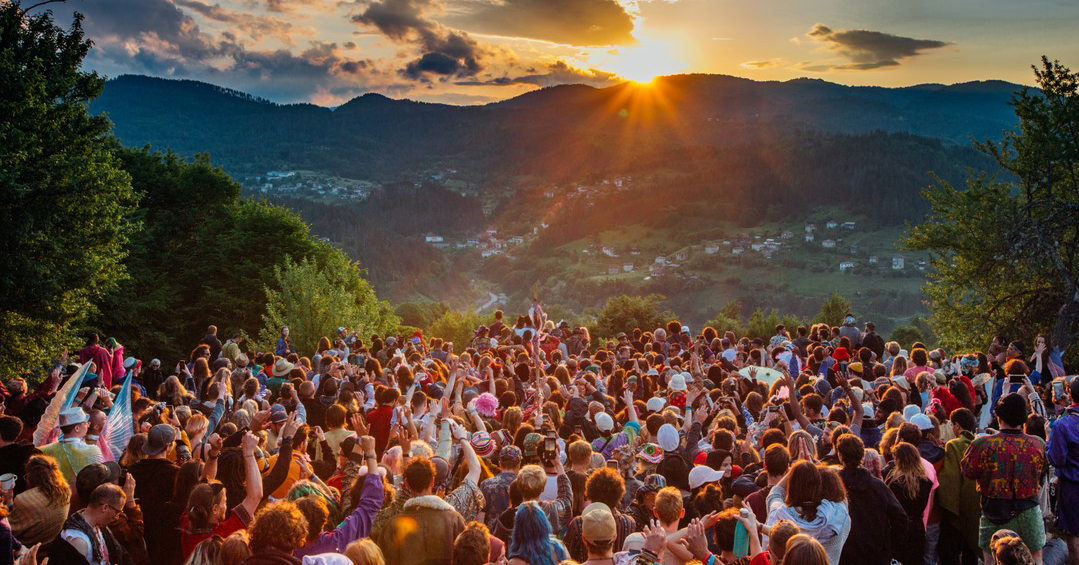Meadow in the Mountains aim to compost and recycle 100% of waste in 2022
In this case study the team at MITM share the findings from their 2019 annual report and their plans for the 2022 edition – from reducing waste to landfill by aiming for 100% compostable and recyclable waste – to harvesting rainwater for showers, heating the water through the composting process and using the run off water and compost to nourish their newly planted Food Forest. Read the full case study below:
Meadow in the Mountains (MITM) is a 3,000 capacity festival set in the heart of the Rhodopian Mountains – an untouched area of natural beauty in Bulgaria. The team at MITM have a unique relationship with their site – many of the team having moved out from the UK to live permanently on the land. The identity of the event has evolved from a small party to international community with a focus towards platforming the arts, protecting and regenerating the mountain and educating their visitors on how to change habits from destructive to regenerative. After the 2019 edition, the team at MITM undertook an environmental audit and published their first annual report sharing the data and their subsequent planning for environmental initiatives at future events to tackle key issues and protect the mountain habitat.
“When you’re surrounded by this kind of environment and nature, you cant help but feel the need to preserve it – having just recycled and composted 89.9% of our waste, we now hope to reach zero waste standards in the near future. By working with local organisations and Ecolibrium the next step is to achieve carbon neutrality.”
Aidan McKearney, Environmental and Camping Director / Owner, MITM
One of the challenges for the team was waste: ahead of the 2019 event they had already put in place composting for food waste, and implemented a policy of reusable vessels for festival-goers. The result was that only 10.1% of total waste went to landfill with 63% (13,280kg) of all waste from food, including plates and packaging, being fed back to the mountains as compost by designing their site, food systems and toilets with nature in mind. 26.6% (5595kg) of recyclable waste collected on site was sent to recycling depots in Bulgaria – and the team has put next steps in place to assess the breakdown of those materials so that they can better plan for the next edition.
Their initiatives have meant that only 10.1% of total waste (2120kg) was sent to landfill. Though low in comparison to industry averages this still represents too much in their opinion, so for the next edition they plan to remove all landfill bins to ensure that all waste must be separated into compostable or recyclable.
In 2019, MITM served 40,595 drinks straight into reusable vessels, preventing approximately 405.95kg of plastic waste. To reduce plastic cups on site the team sold flasks and mugs at the event – over 4000 were sold – adding to the global circulation of reusables that continue to prevent plastic bottles and cups being used and wasted during day-to-day life.
Another key issue they identified was waste from cigarettes. Collecting the waste is a huge task in itself – and disposing of it also difficult. The MITM team have decided to conduct our own experiments with composting the waste to see for ourselves how it breaks down after 6 and 12 months. In the meantime, they are working on solutions to prevent as much of that waste from entering their site as possible.
Throughout the lead up to the event the team harvested 27,000 litres of rainwater, 12,000 litres of which was used for showers during the 2019 event and 15,000 litres was allocated for general use across the festival. The rainwater for showers was heated naturally from the compost – with a system in place to transfer the natural thermal energy of the composting process to provide hot showers for festival-goers.
2019 also marked the beginning of their ‘food forest’ – an orchard positioned just behind the showers so that the new growth can benefit from the run off water. They now have apple, pear, plum, fig, and walnut trees growing onsite – all of which are nourished from the compost from last years’ waste.
The MITM team are aware that their biggest environmental impact is from the travel needed for many of their audience to get to the site. Up to 65% of festival-goers travel from the UK meaning that some air travel is inevitable. For the next event the team are exploring links with alternative transport providers, looking for discounts for rail and coach travel and running dedicated coaches from main set off points.
“We want to have no negative affect on the environment and its extremely important because we are in a time right now where its make or break. We really want to be pioneers of that movement in the festival industry and show people that you can put on an event and not damage the environment. Sometimes all it takes is to come back to nature to rediscover what the meaning of life is all about.”
Benji Sasse, Co-Founder, MITM
Throughout the event they have shuttle buses to and from the main airports and travel hubs nearby – coordinating with arrivals to make travel easier and reduce the need for taxis and cars arriving at site.
For unavoidable emissions the team are working with live event industry charity ecolibrium to offer carbon balancing to festival-goers – this means travellers to MITM 2022 can donate to climate solutions programmes such as tree planting, ecosystem protection, restoration and regeneration or projects that create clean renewable energy.
Find out more https://www.meadowsinthemountains.com/

